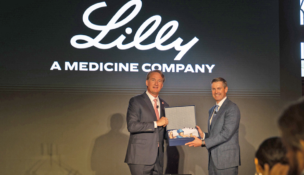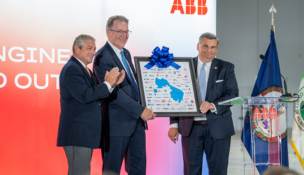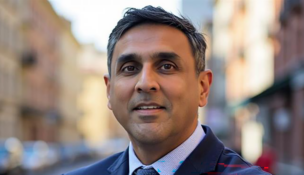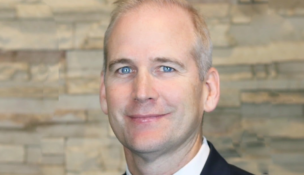Charlottesville nurtures biotech startups
U.Va.'s Manning Institute, CvilleBioHub provide support

Noah Piper, 8, was the inspiration for his father, Neal Piper, to found Luminoah, a biotech startup based in Charlottesville. Photo by Jay Paul

Noah Piper, 8, was the inspiration for his father, Neal Piper, to found Luminoah, a biotech startup based in Charlottesville. Photo by Jay Paul
Charlottesville nurtures biotech startups
U.Va.'s Manning Institute, CvilleBioHub provide support
SUMMARY:
- Charlottesville‘s biotech ecosystem is growing
- CvilleBioHub‘s Commonwealth Bio Accelerator gives space for startups
- The University of Virginia’s Manning Institute of Biotechnology provides support as well
When Neal Piper’s son, Noah, rang the bell at UVA Children’s Hospital in December 2020, it signaled the end of grueling chemotherapy treatments connected to beeping monitors and intravenous tubes.
Five years later, Noah is a healthy third grader who will turn 9 in July, and the biotech business his dad launched, Luminoah, is also thriving.
Piper, who lives in Charlottesville with his family, expects the new feeding tube system produced by Luminoah to be approved by the Food and Drug Administration by the first quarter of 2026, which would clear it to go to market.
Like other companies in Charlottesville’s rapidly growing biotechnology sector, Luminoah has a mission to “change the standard of care” through innovation, Piper says. Whether it’s through new therapeutic drugs or medical devices, dozens of startups and established companies have adopted the same refrain.
Meanwhile, the University of Virginia’s $350 million Manning Institute of Biotechnology is helping drive further growth in medical innovations, with a 350,000-square-foot building under construction and expected to be occupied in late 2026.
In 2019, Noah Piper was diagnosed with a brain tumor, and doctors told Neal Piper and his wife, Valeria, that Noah would need to get his nutrition through a feeding tube.
Neal Piper recalls seeing a rocket ship on the wall they saw each time they visited their son at the children’s hospital. Looking back on it now, Piper sees the rocket as a metaphor for his family’s journey since Noah’s cancer went into remission. Inspired to help other families and individuals facing similar challenges, Piper started Luminoah, named for his son, after conceiving of a portable tube-feeding device that’s compatible with smartphones and able to track nutritional intake.
As of May, Piper says Luminoah has raised $10 million in capital and employs 10 full-time workers. If the feeding device receives FDA approval as expected in early 2026, it would allow the company to begin scaling up extensively. But that wouldn’t be possible without locally available support, says Piper, who spent 15 years in commercial health care, including at pharmaceutical giant Pfizer.
“If we weren’t in the commonwealth, and particularly in Charlottesville in this ecosystem, I think I could have just been another dad with a passing idea to make a difference,” Piper says. “I wouldn’t have had a network and support to see it through. As a result … that ripple effect can impact the lives of millions of people.”
Accelerating innovation
In April, the nonprofit CvilleBioHub opened the Commonwealth Bio Accelerator, a 6,500-square-foot lab and office space in U.Va.’s North Fork business park in Albemarle County designed to help new biotech companies get started. Since 2016, CvilleBioHub has supported more than 100 early-stage startups, and its executive director, Nikki Hastings, says the accelerator has room to accommodate six companies.
Tenants will have equipment and mentoring opportunities available, and once the Manning Institute opens, there will be more biotech support available just down U.S. 29 in the Fontaine Research Park.
The institute is expected to foster research on cellular therapy, gene therapy and nanotechnology while expanding U.Va.’s capacity for clinical trials.
In 2023, Albemarle philanthropists Paul and Diane Manning launched the institute with a $100 million gift to U.Va., with $150 million committed by U.Va. and $50 million by the state. In December 2023, the university broke ground on the institute’s home building, but in the meantime, it has begun hiring more scientists to conduct medical research to discover treatments for cancer, diabetes and other diseases.
Paul Manning, who started a biotech-focused private equity firm that invests in life sciences and pharmaceutical startups, has said that he hopes the institute will “transform the future of medicine.”
Meanwhile, the state’s GO Virginia economic development initiative has supported CvilleBioHub annually since 2020. The state pitched in $4.3 million for the Commonwealth Bio Accelerator, while the Mannings’ foundation, private donors and Albemarle and Charlottesville covered the rest of the $7.5 million project.
Although the new facility has limited space, Hastings says the companies primed to launch there are seeking to develop medications for lung fibrosis and genetic epilepsy, as well as a novel liquid biopsy blood sample analysis method for improved cancer detection.
“We’re trying to fill a lot of the gaps that exist in our entrepreneurial ecosystem,” Hastings says. “As companies are spinning out great research coming out of the University of Virginia, we’re asking how do we help them to make good decisions on the things that they need to do to commercialize their product and bring their ideas to market.”
Hastings and other leaders started CvilleBioHub in 2016 with several networking events. They learned quickly that there were brilliant people with innovative ideas in the community, but many of them found it difficult to connect with investors and other entrepreneurs who could help them succeed.
CvilleBioHub has helped ease that challenge for startup founders and has also encouraged more investment from the state and private sector. And the new accelerator will offer entrepreneurs another avenue for success, Hastings says.
“We’re also giving them the facilities and infrastructure that have been severely lacking in our region, to get them up and going and continuing to do their research.”
One of the more than 70 companies under the CvilleBioHub umbrella is Rivus Pharmaceuticals. Still in the clinical research stage, Rivus was established in 2019 with the goal of developing weight-loss medication that’s designed to reduce excess fat, maintain muscle mass and combat cardiometabolic diseases.
Allen Cunningham, Rivus’ co-founder and chief operating officer, has been working in Charlottesville’s biotech ecosystem for more than 20 years. He says it’s grown tremendously in the last decade as leaders like Hastings have advocated for stronger partnerships and connections, which in turn have drawn the attention of institutional investors from across the country.
“These investors are critical to fund the capital-intensive clinical development necessary to bring new therapies to patients,” Cunningham says. “With [U.Va.] and the increasing number of biotech companies in Charlottesville, there is an excellent pool of R&D resources to draw from to support the growth of companies like Rivus and others in our community.”
Big biotech
While pharmaceuticals and medical devices compose large parts of the biotech sector, the industry broadly spans the realm of life sciences. Through research on animal and plant cells, biotech has the potential to unlock breakthrough discoveries for disease-resistant crops, renewable energy sources and cancer treatments.
A recent example of biotech at work was the rapid development of mRNA vaccines for COVID-19, which helped immunize millions of people against the pandemic virus after it emerged in 2020.
In Virginia, around 3,400 biosciences companies employ a total of more than 30,000 people, according to Virginia Bio, a nonprofit state trade association based in Richmond.
As the number of biotech companies in Virginia leaped by 50% between 2019 and 2023, the industry’s average annual wage has increased to $107,000, making it one of the state’s highest-paying industries. Overall, biotech contributes $8.4 billion to the state economy, according to industry studies.
While Boston and North Carolina’s Research Triangle are famous for their biotech prowess, biotech trade publication GeneOnline ranked the Maryland-Virginia-Washington, D.C., region as the nation’s third best region for the industry in 2024, with Charlottesville and the Manning Institute specifically touted.
Virginia Bio CEO John Newby concurs, saying that Virginia biotech entrepreneurs benefit from proximity to the state’s wealth of research universities and hospitals, defense contractors, military bases and the federal government.
“It’s just a rich environment to find opportunities in life science and biotech,” Newby says. “Looking at this through the lens of a young professional looking to start her career or as she progresses, she doesn’t have to stay in just one silo. She doesn’t have to stay in the private sector. She can go to the government sector or a regulatory agency. She can go to Capitol Hill if she wants to do policy. You can do all that in this region.”
Industry leaders in Charlottesville have been at the forefront of advocating for stronger business relationships and mentoring by formalizing the “biohealth [hub] concept,” and stand out as leaders for the rest of the state, Newby says. “They were the first ones to do it, and they’ve done quite a good job.”
‘Collaborative community’
Often, biotech innovators are driven by experience and needs. Two of the Mannings’ children required specialty medical care and Luminoah founder Neal Piper started Luminoah after his son’s cancer diagnosis.
“He would spend most of the day at U.Va.’s Children’s Hospital getting chemo, and he would come home and all he wanted to do is play with his twin sister, but instead, he was tethered to an IV pole,” Piper recalls. “That meant he had to sit on the couch getting fed for up to six hours, and then he was also attached overnight, doing overnight feeds. And so, his quality of life was completely turned around as a result of needing this therapy.”
Piper knew he could do something about it and saw an opportunity to leverage his professional background and connections. That’s how Luminoah began.
“I’ve found that each chapter of a journey in life enables you to get confidence and really build on muscle memory,” he says. “You can have knowledge based on experience, but you really need a strong reason to drive innovation forward. And those two came together for us.”
Will Mauldin, CEO and co-founder of Rivanna Medical, started his medical imaging company in 2010 as he was completing a doctorate in biomedical engineering from U.Va.
Originally from North Carolina, Mauldin came to Charlottesville with the idea of starting his own business. Rivanna Medical has since created advanced ultrasound equipment and imaging software for administering epidural anesthesia.
“I found that U.Va. was a place where I was most likely to be successful,” Mauldin says, explaining why he chose to study there. “As far as innovation and entrepreneurship, the setup at U.Va. was really strong for me.”
With a product already in the marketplace, Rivanna Medical continues to grow as the federal Department of Health and Human Services awarded it a $30.5 million grant in 2023 to develop a new ultrasound-based device to detect bone fractures in wrists and ankles.
Mauldin says the advancement would help emergency personnel manage triage in a mass casualty blast, but it could also have an application in urgent care clinics, as technicians could check for broken bones with the equipment.
As one of the more established biotech startups in the Charlottesville area, Mauldin has seen how CvilleBioHub has strengthened an already robust entrepreneurial ecosystem. He’s also been able to share some of his wisdom and experience with new startup founders, counseling them on how to strategize timelines and account for extended clinical trials or regulatory processes.
“We went through all those first initial steps, and I would definitely do it differently if I did it again. So, I’m very happy to share that,” Mauldin says. “We have a very collaborative community. I think we all see the benefit of that.”
Charlottesville at a glance
Widely known as home to Thomas Jefferson’s Monticello estate and the University of Virginia, the Charlottesville region is located about 65 miles west of Virginia’s state capital. The city was founded in 1762, with the Jefferson-designed U.Va. campus founded 57 years later. The region is popular for vineyards, breweries and distilleries, as well as for access to the Blue Ridge Mountains. The area’s largest industries include higher education, health care, defense, hospitality and tourism.
Regional population*
Charlottesville: 51,743
Albemarle County: 117,790
Buckingham County: 16,736
Fluvanna County: 28,382
Greene County: 21,717
Nelson County: 14,788
Orange County: 38,778
Major employers
University of Virginia/UVA Health
Albemarle County
Sentara Health
City of Charlottesville
U.S. Department of Defense
Northrop Grumman
Crutchfield Corp.
CFA Institute
Major attractions
Monticello, the home of America’s third president and author of the Declaration of Independence, is a UNESCO World Heritage Site that draws visitors from around the globe. You can see the distinctive Jefferson-designed Rotunda at U.Va. Another must-see for history-minded visitors is Highland, the Albemarle estate of President James Monroe. Charlottesville’s Downtown Mall is a good place to visit for eating, shopping and socializing. Take in the natural beauty of the surrounding Blue Ridge Mountains along Skyline Drive and the Blue Ridge Parkway and at Shenandoah National Park. Hikers will savor Instagram-worthy views from Spy Rock and Humpback Rocks. Take a break from picking apples and peaches at Carter Mountain Orchard with live music and apple cider doughnuts. Or take a tasting tour through area wineries like Jefferson Vineyards, Trump Winery, Blenheim Vineyards and Pippin Hill Farm & Vineyards.
Major convention hotels
Boar’s Head Resort
22,000 square feet of meeting/event space;
168 guest rooms and suites
Kimpton The Forum Hotel
22,000 square feet of meeting/event space;
208 guest rooms and suites
Omni Charlottesville Hotel
12,441 square feet of meeting/event space; 205 guest rooms and suites
Boutique/luxury hotels
Albemarle Estate at Trump Winery
The Draftsman
Graduate Charlottesville
Keswick Hall
Oakhurst Inn
Notable restaurants
C&O
French, candorestaurant.com
Ivy Inn
American fine dining, ivyinnrestaurant.com
Oakhart Social
Seasonal American, oakhartsocial.com
The Spot
Gus Burgers and fries, thespotuva.com
The Ridley
Southern, ridleyva.com
*July 2024 population estimates from University of Virginia Weldon Cooper Center for Public Service based on 2020 U.S. Census Bureau data
l

















